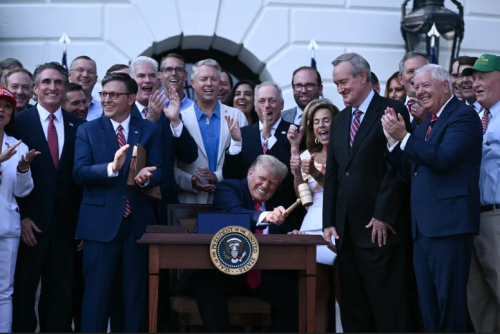President Donald Trump’s Big Beautiful Bill passed into law last week—perhaps unfortunately so. Traditionally, Washington D.C. is supposedly the place where the business of the American people is transacted through negotiation and compromise. But today, that balance appears inverted.
Those who need help the least assistance are receiving the largest breaks —permanent tax cuts for wealthy individuals, expanded estate exemptions, and generous corporate deductions— while the most vulnerable are being asked to shoulder the burden. through temporary personal deductions and deep cuts to social support programs
The reasons for this extreme reversal seem rooted in a top-down culture of pressure—bribes, threats, and political maneuvering that leave little room for dissent. Before the final vote was taken on Thursday, July 3rd one last effort to bring clarity and conscience to the process was made by House Minority Leader Hakeem Jeffries. Over the course of 8 hours and 44 minutes, he dissected the 887-page bill, exposing how it adversely affects millions of Americans.
Though Jeffries marathon speech did not prevent the bill’s passage, it clearly serves as a warning to everyone. It alerts us to the discomforts—and in some cases, the mortal consequences. And it is made clear exactly who is pushing for all this to happen.
Projected Impacts of the Big Beautiful Bill
- Healthcare & Medicaid: $900B in cuts. Up to 20M Americans may lose coverage.
- Food Assistance: SNAP cut by up to $287B; including parents of kids over 7.
- Tax Policy: $3.7T in permanent breaks—mostly for the wealthy.
- Clean Energy: Major tax credits repealed. Fossil fuels and Arctic drilling re-funded.
- Immigration: $75B pumped into detention and deportation systems.
- Education: Grad PLUS loans cut, student borrowing capped, Pell access narrowed.
- Debt: Adds $3.4T to the national tab. Debt-to-GDP may hit 183% by 2054.
Since many of the bill’s most consequential provisions won’t take effect until after the 2026 midterm elections, it’s essential to pay close attention to the candidates and the programs they support. The future impact of this legislation hinges on who holds power when the consequences arrive.

The supporters who gathered to celebrate the passing of the Big Beautiful Bill show a curious energetic omission; there are no Tuesday births among them. In Dayology terms, an absence of the Mars Ray—which is aligned with drive, confrontation, and unflinching individualism—is very significant. These guests are not known for taking the lead, but for aligning with the momentum. Their presence reflects a preference for reward, not direct action or heroic resistance.
THE HOSTS
• #63 FRI GEM Donald Trump – 6/14/1946
• #02 SUN TAU Melania Trump – 4/26/1970
THE FEATURED GUESTS
• #02 SUN TAU – Mike Crapo – 5/20/1951
• #11 SUN AQU – Mike Johnson – 1/20/1972
• #02 SUN TAU – Jason Smith – 6/16/1980
• #16 MON CAN – John Barrasso – 7/21/1952
• #43 WED LIB – Steve Scalise – 10/6/1965
• #53 THU LEO – JD Vance – 8/2/1984
• #60 THU PIS – Jodey Arrington – 3/9/1972
• #72 FRI PIS – Tom Emmer – 3/3/1961
• #76 SAT CAN – Lindsey Graham – 7/9/1955
• #82 SAT CAP – John Thune – 1/7/1961
→ No Tuesday Births
The Tuesday Page of the Dayology Almanac explores the many aspects of this weekday and its planetary ruler, Mars. Though often seen as disruptive, Mars primarily energizes our lives—sparking initiative, boldness, and the courage to act on conviction. Those influenced by this ray challenge authority, push boundaries, and forge ahead even when the path is uncertain.
At the July 4th White House celebration following the passage of the Big Beautiful Bill, none of the featured attendees were born on a Tuesday. Without Mars-impelled individuals the momentum behind the bill could not have come from within the group – it was imposed from above. It required the forceful will of President Trump to push the legislation into motion,
Curiously, Trump himself has no Mars in his Dayology Signature. His agenda lacks internal moral force, veers unpredictably, and often falters. What he can’t summon from within, he imposes outwardly — using pressure and spectacle to push his preferred outcomes in to reality. He is not a revolutionary, but a political opportunist, fueled by greed and power, not purpose.


